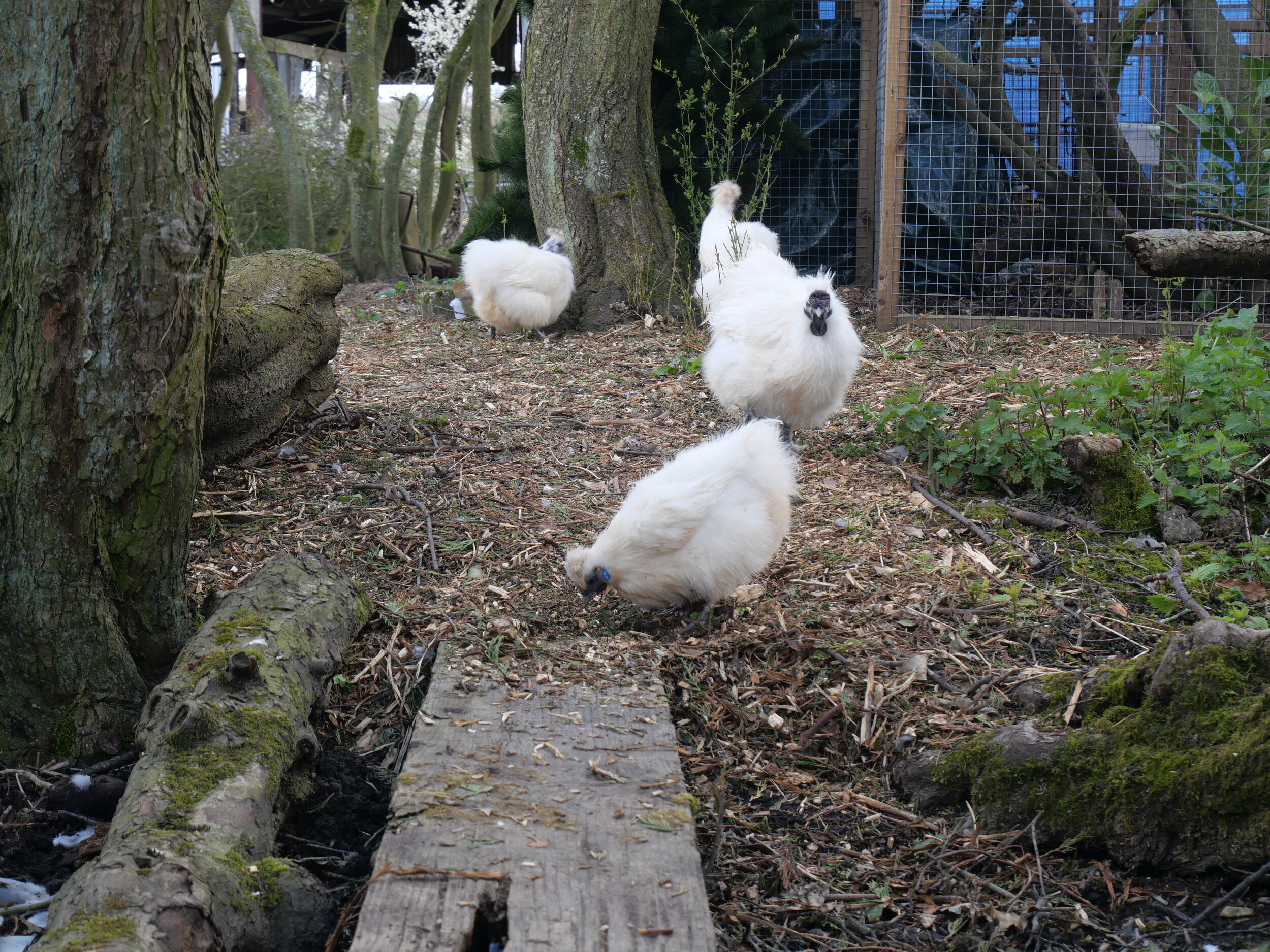HOW TO STOP A SILKIE BEING BROODY
If you’ve kept chickens for any length of time, you’ll know only too well the troubles of broody hens. Cute friendly girls turn into shrieking, pecking beasts everytime you get anywhere near their nest box. If you keep silkies, dealing with these monsters will become on ongoing pleasure!
Why Do Chickens Go Broody?
If you chicken goes broody, don’t be too harsh on her. It’s not her fault; it's a biological earning. Naturally a hen would lay a clutch of eggs and then sit on them to incubate until chicks hatch. It’s also not just a behavioral change either - a hen’s actually physiology changes in order to help her successful rear her offspring. This is also why it can be extremely hard to stop a silkie being broody because you’re not only dealing with simply stopping her getting to the nest and eggs. She has actually physically changed, producing more heat and losing feathers on her chest in order to incubate the eggs.
Some of my silkies exploring the wood
EARLY SIGNS
Step one in being able to stop a silkie being broody is to spot the signs early on. Be aware that hens are more likely to become broody in the spring, and they won’t do so until laying a few eggs first. So your silkie hen will not suddenly become broody … she will lay a small clutch first.
Signs to look out for include your hen sitting in her nest more than usual, laying an egg and not coming off it straight away, reluctance to get off the nest when you put your hand in, and increased vocalisation towards you. Hens will also raise their neck feathers more, especially when they start to cluck at you, and when you remove her from the nest, her feathers will be more puffed up than normal.
A silkie protects her eggs.
HATCH YOUR OWN CHICKS IN AN INCUBATOR
KEEP CHICKS WARM WITH AN ELECTRIC HEN
BLOCK ACCESS TO THE NEST
A quick and easy way to try and prevent broodiness occurring once the first signs appear is to block access to the nestbox. Unfortunately this simply isn’t possible in many situations. If you have an entire coop of hens, for example, blocking a nestbox for one broody will mean none of the other chickens can gain access to lay their eggs.
You can attempt to block nests after a certain time. If you let your hens out in the morning for instance, block access after midday. That way your hens can still lay their eggs but the broodies can’t remain on the nests for long.
ROLL-AWAY NESTBOXES
Another option is to use roll-away nestboxes. This can be a good option because as soon as an egg is laid, the nestbox rolls it away. Chickens cannot brood eggs in this case, which helps to stop broodiness developing. Such nestboxes are also clean of nesting material too. This means that silkie hen cannot make a nest in the first place.
HEN REMOVAL AND COLD DIPS
If you have a single silkie hen that is being broody, you can leave her in the coop but simply remove her from the nest. Bear in mind that you’ll need to do this consistently throughout the day because every time you remove her, she’ll eventually end up going back to her nest and/or eggs. When you remove a hen from the nest, you increase the cold air circulation around her chest and legs and this can combat the physically changes I talked about earlier. You can also stand your hen in cold water for a few minutes every time you remove her or use a bottle of frozen water. Wrap the bottle in a teatowel first however, as applying a frozen bottle directly to the skin or feathers could cause injuries.
SILKIE JAIL
Silkie jail might sound cruel but it’s actually in the best interest of your hen. Removing her from the nest and cooling her off several times a day takes a lot of work and unless you’re at home throughout the day, simply not realistic.
Instead, considering removing your hen from the coop and nest altogether and placing her on her own. If you choose to do this, place her in a cage with a wire floor. The idea is not to limit her food or water but to increase air circulation around her legs and chest. Give her food and water as normal but no nesting material or bedding in which she could attempt to make a nest.
Silkies, in particular, can be very hard to break from broodiness so she may have to stay in broody jail for several days, possibly even a fortnight. Remember to consider your hens welfare at all times ; if it is going on for too long, you may need to change your approach.
FERTILE EGGS
As a last resort, you can consider giving your silkie hen some fertile eggs to hatch. This will break the broodiness because as the chicks hatch, the cycle will have completed and she’ll then become a mum instead of an incubator.
A silkie hen with her chicks
WHY BREAK BROODINESS?
You might think that breaking broodiness is simply a convenience for us. During the time she’s broody, your hen will not lay eggs. However, she will also not eat, preen or maintain herself properly either. Chickens left to be broody have been known to starve themselves to death simply waiting for eggs to hatch.
Therefore, it’s vital to either break broodiness or let a hen hatch some chicks. I prefer to use my silkie hens as mothers because they are very difficult to stop being broody and it is much easier to give a hen a few eggs to hatch than to constantly try to fight mother nature. Silkie’s don’t lay very much anyway, so you shouldn’t be losing out on too many eggs. Plus you get to see the wonder of a mother hen and her chicks.
If you have any questions, please ask below!



